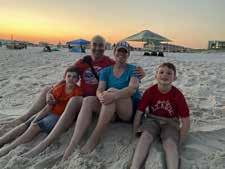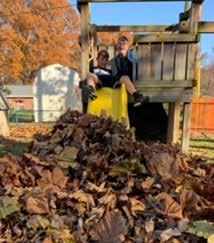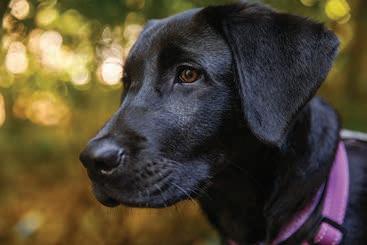
8 minute read
meet william gossard By Maria Smietana
Receiving the Diagnosis of SeSAME/EAST Syndrome

Advertisement
When Abigail (Abby) and Brian Gossard brought home their first child, a baby boy named William, they only knew that his initial hearing test was inconclusive. “As we left the hospital, all we knew was that he had an unconfirmed hearing test – meaning they couldn’t say he for sure had hearing loss but couldn’t say he could hear,” Abby recalled. When William was 12 weeks old, an ABR (auditory brainstem response) test was done. The ABR test reveals whether the inner ear, called the cochlea, and the brain pathways for hearing are working. The ABR test is often used in babies and young children who can’t undergo a typical hearing test. William’s results were again inconclusive, but when the test was repeated under sedation, it was confirmed that he did indeed have profound hearing loss. The following day William started having seizures, and shortly thereafter, his parents learned that his muscle tone was really weak. “So, for four years, we treated the hearing loss with hearing aids (he received his first set at 6 months and responded well to them) and music therapy to specifically help with his speech,” Abby said. “We did physical and occupational therapy for his [muscle] tone and fine motor issues, and then treated the seizures with meds.” When he was 4, William had a particularly bad seizure that lasted 15 minutes, which resulted in an ambulance ride to a local hospital in Lafayette, where the Gossards live. He was transferred to Peyton Manning Children’s Hospital in Indianapolis. His neonatologist, Dr. Luis Escobar, decided to request more genetic testing. Dr. Escobar had done some previous genetic testing on William, but the focus had been on possible mitochondrial disease. With this hospitalization, the Gossards also learned about William’s kidney issues for the first time — “basically his kidneys filter out potassium and magnesium really quickly and he needs supplements to keep his electrolytes up, Abby said.” Now, the puzzle pieces from the various genetic and laboratory tests could be put together, and William was finally diagnosed with EAST syndrome (Epilepsy, Ataxia, Sensorineural hearing loss, and Tubulopathy), more commonly known now as SeSAME (Seizures, Sensorineural deafness, Ataxia, intellectual (Mental) disability, and Electrolyte imbalance) syndrome.

Though having a diagnosis after so many years of uncertainty was comforting for the Gossards, there was little that changed on a practical level. William’s symptoms were already being treated with the best possible therapy and medication, and there is no
cure for EAST syndrome. “We’ve had to learn to be flexible and patient,” Abby said. “We’ve also had to lean on our family and ask for help with taking care of our other son (James was born when William was 2) during those long hospital stays that William goes through.”
If the diagnosis brought any surprises for the Gossards, it was how incredibly rare EAST syndrome is. “We know of one other family with a child that has the same diagnosis as William,” Abby said. “They live in the UK. We feel that the more open we can be about our [son’s condition], the better our chances of finding more families like us.”

William is now 10, and his younger brother, James, will be 8 in January. They both go to Edgelea Elementary School, where William is in third grade and James in second. “Edgelea has a deaf/hard of hearing classroom that allows William to be with other kids in the district who also have (cochlear) implants and require some extra assistance,” Abby said. Like other special needs children, he has an individual education plan (IEP), and
much of his life outside of school is taken up with therapy. But in many ways, William is like any typical kid. He loves tater tots, cheers for the Purdue teams, and is a big fan of Ben and Holly’s Little Kingdom. His favorite subject in school is math, and when he grows up, he wants to be a chef, a doctor, and a firefighter — big dreams, just like a lot of 10-year-olds.

William’s outgoing personality has helped him fit in and build his social skills. “He’s usually talkative, and can be really funny and silly,” Abby said. “He’s more reserved when he’s in a new situation. He has friends in every class who he adores and who adore him. And he’s a typical older brother — tattles on James and tries to keep him in line. James will mess with William and the two will wrestle! In the photos, they were giggling going down the slide into the leaves and pushing each other on the swing. It’s been really fun to see their friendship grow.”
Abby can’t say enough good things about Hear Indiana, a not-forprofit dedicated to providing hearing and spoken-language services to hard-of-hearing and deaf children. “Every week, we meet with our beloved speech therapist who has become an addition to our family (she’s even dug through the cushions of my furniture looking for a cochlear implant!),” Abby laughed. During the pandemic, William has had his appointments via teletherapy. “We’ve visited their audiology department for multiple hours in the hearing booth, testing and adjusting implants. Not to mention, in every hard situation – school conversations, managing William’s IEP, conversations with surgeons about re-implantation surgeries, and just advice on behaviors — we almost always involve the team at Hear Indiana.”
Hear Indiana also offers parent education events and runs the only camp in Indiana for kids with hearing loss. “Talk about amazing,” Abby said of the camp. “The staff deals with all the cochlear implants and hearing aids, including keeping them dry when the kids go swimming.” William also had surgery for Cochlear Implants in 2017 and used Hear IN’s services (audiology, speech therapy, and family support) since his implantation.
Dealing with the emotional ups and downs of raising a special needs child is very familiar to Abby and Brian by now. “Stay positive but also have a safe place to express other emotions,” they advise. “Everyone needs to know they have a place for support without judgment. And when anyone offers solutions, suggestions, or guidance, it should be viewed as helpful instead of judgmental. That goes both ways!”
Like most kids, William isn’t always crazy about trying new things when they are presented to him. Such was the case with equine therapy. “His occupational therapist, Beth, tried for several years to encourage William to participate, but he was too afraid to even touch the horses,” Abby said. This past summer, he got to a point where he was at least willing to visit the barn at Wee Speak Therapy. “We met the owners and the volunteers, watched the other kids ride, and slowly he progressed each week towards the horses. He would paint while the horses stood still, and then got enough courage to put bows in their manes. By September, he got on a horse and rode for the very first time to celebrate his dad’s birthday! A few weeks later, we started doing physical therapy on the horse, so he’s riding two days a week, and it’s his favorite place to go now. He’s in heaven.”

William wasn’t the only member of the Gossard family who had a breakthrough this summer. A few years back, when it became clear that taking care of a special-needs child was a huge job, Abby decided to leave the workforce. But she missed the intellectual challenge of working and the satisfaction of contributing to the family income, so she became a consultant for a nutrition and weight loss company, something she could do from home. It worked out fine until 2020 hit with full force, and she understandably found herself a little overwhelmed. Then some of her fellow nutrition coaches encouraged her to hand off all the things she thought she “should” do and focus instead on the things only she can do for her family and her business. “Ask for help and don’t feel guilty,” is her new mantra. She hired a cleaning lady, experimented with meal delivery, and gets someone to watch the boys so she can work on her business, or take her hubby on a date. “Don’t be stressing over house cleaning, laundry and dinner,” she now advises other women. “It’s the best darn decision I ever made!”

If you would like to share your personal or family story, or to nominate
someone else to be in an upcoming issue of Special Needs Living? Email us at SpecialNeedsLivingIndy@n2pub.com
Purchase an ICAN 2021 Calendar! • Adorable images of ICAN pups-in-training! • PAWfect for holiday gifts and stocking stu ers! • Your purchase will help ICAN train service dogs for people with disabilities. To learn more, visit icandog.org

Dogs are amazing creatures. Their gifts to humanity are loyalty, love and service. For over a decade, ICAN has been successfully placing dogs into meaningful relationships with children and adults who have physical and developmental disabilities and may need assistance with daily activities.
We also place dogs into special needs facilities throughout Indiana. To learn more about the type of service dogs we place, please visit icandog.org or call 317-250-6450
5100 Charles Court | Suite 100 Zionsville, IN 46077 www.icandog.org










